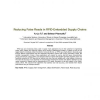Free Online Productivity Tools
i2Speak
i2Symbol
i2OCR
iTex2Img
iWeb2Print
iWeb2Shot
i2Type
iPdf2Split
iPdf2Merge
i2Bopomofo
i2Arabic
i2Style
i2Image
i2PDF
iLatex2Rtf
Sci2ools
113
click to vote
JTAER
2008
2008
Reducing False Reads in RFID-Embedded Supply Chains
RFID tags are increasingly being used in supply chain applications due to their potential in engendering supply chain visibility and reducing tracking errors through instantaneous location of objects as well as the tagged object's immediate ambient conditions. During its life-time, an RFID tag is highly likely to physically pass through different organizations that have disparate information systems with varying information needs. We consider management of data in these applications with respect to volume, data and query characteristics, privacy and security, among others, and propose means to reduce false positive and false negative reads. The beneficial properties of RFID tags can be realized only when they are readable with a high degree of accuracy. The read rate accuracy in turn depends on several factors including the medium and distance between tag and reader, presence of objects that are impenetrable by RF signal, orientation of tag with respect to the reader, among other...
| Added | 13 Dec 2010 |
| Updated | 13 Dec 2010 |
| Type | Journal |
| Year | 2008 |
| Where | JTAER |
| Authors | Yu-Ju Tu, Selwyn Piramuthu |
Comments (0)

